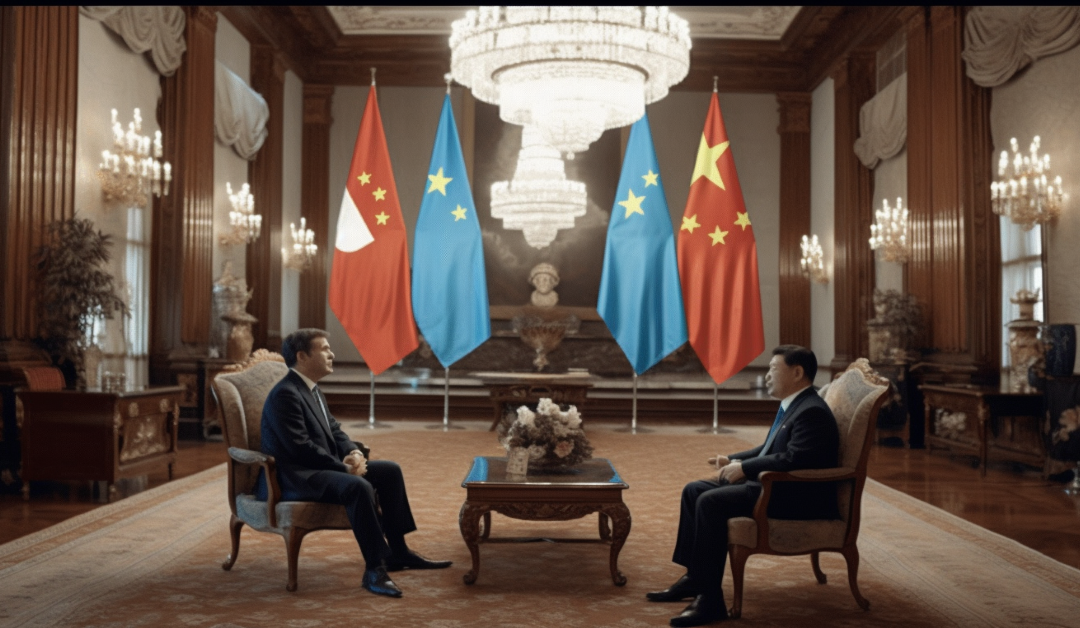
by Samuel Mbaki | Jun 1, 2023 | Banking, Finance
Key points
- Tesla CEO Elon Musk has regained his status as the world’s richest man once again as he overtakes Bernard Arnault.
- Elon Musk toured China for the first time in three years on May 31, 2023, meeting China’s foreign minister Qin Gang.
- Musk commented on the status of China and America as co-joined twins saying the two world’s largest economies shouldn’t be breaking their ties through de-dollarisation
Elon Musk regains his richest man status as he tours China
Tesla CEO Elon Musk has regained his status as the world’s richest man. According to a report by Bloomberg, Tesla’s CEO and Twitter’s new owner passed Benard Arnault as the richest man on Wednesday after the shares of Arnault’s LVMH fell by 2.6% in Paris Trading.
Now, Musk’s total net worth stands at around $192B. The report comes when Elon Musk is on his Chinese tour for the first time in the last 3 years. Musk met with China’s Minister of Foreign Affairs, Jin Zhuanglong, and discussed the development of electric vehicles.
Though Musk has yet to speak publicly about the contents of his meeting with the Chinese executive, the minister said that Elon Musk agreed to build more factories to produce electric vehicles.
Elon Musk is now among a growing list of US executives to visit China this year on business trips as economic relations continue to sour. JP Morgan Bank Chief Executive Officer also visited China this week. Apple CEO Tim Cook was also there in March following a series of strikes that had affected his company in earlier months.
Though the ties between Washington and China are growing as the Asian nation is planning on ditching the dollar in favor of a new economic trade bloc, BRICS, Dan Ives from investment firm Wedbush Securities has said that it’s a key chess move for Wall Street executives to foster a great business relationship with Beijing.
.

by admin | Jun 1, 2023 | Banking, Finance
Key Points
- The House passed a debt ceiling bill on Wednesday night, days before the U.S. Treasury runs out of money to pay its bills.
- The Fiscal Responsibility Act was formed due to a deal between Speaker Kevin McCarthy and President Joe Biden in May.
- Though the bill has been met with opposition along the way, it is currently the only solution to the looming debt default crisis. Senate Majority Leader Chuck Schumer has said the Senate will do all it can to move the bill quickly.
Debt default deadline days away as Debt Ceiling bill heads to the Senate
The Fiscal Responsibility Act, a bill meant to push the U.S. debt ceiling, passed in the House of Representatives on Wednesday night by a wide margin. It will now head to the Senate for another voting process ahead of the June 5, 2023, deadline for the U.S. Treasury to default on its debt.
The Fiscal Responsibility Act passed with 314-117 votes receiving more support from Democrats and Republicans than expected. The majority leader of the Senate, Chuck Schumer, has said that the Senate will do all it can to move the bill along quickly, signaling that it has a high expectancy of being passed and signed into law by President Biden.
The new developments culminated in a sensitive two weeks of tense negotiations between lawmakers on how to go forward as the economy was under the threat of debt default. The bill has now reached the Senate stage, and the leaders on both sides want to pass it within 48 hours.
Senate Majority Leader Chuck Schumer commented on the story, saying:
“There’s been a very good vote in the House. I hope we can move the bill quickly here in the Senate and bring it to the president’s desk as soon as possible.”
Keep watching Fintech Express for updates on this and other Finance related updates.

by Samuel Mbaki | May 31, 2023 | Banking, Finance
Key Points
- U.S. Treasury Yields have fallen as investors wait for a crucial debt ceiling vote to be held in the House of Representatives later in the day.
- House Rules Committee voted in favor of the debt ceiling vote on Tuesday with a 7-6 majority.
- April’s JOLTs job opening report is due today.
U.S. Treasury Yield recedes as investors await debt ceiling vote
U.S. Treasury yields declined on May 31, 2023, as investors fretted over the ongoing debt ceiling crisis. The House of Representatives is set to vote for a bill that could see the U.S. evade defaulting on its debt, which could have adverse effects and be the first one in its history. Additionally, Investors are also awaiting the April report on key jobs data.
At 5:34 a.m. ET, the yield on the 10-year Treasury was trading 4 basis points lower at 3.654%. The 2-year Treasury yield was last down by more than 3 basis points at 4.436%.
The U.S. markets are reacting to the Fiscal Responsibility ACT that seeks to raise the debt ceiling to avoid the government defaulting on its debt which could happen as soon as June 5.
The bill received a win in the House Rules Committee with a 7-6 vote and is now headed to the House of Representatives floor today for tentative voting. If the bill is passed, it would need approval from the Senate before it is effected.
However, a straight win is not guaranteed as politicians on both sides of the aisle have criticized Speaker Kevin McCarthy and President Biden’s compromise. At least 20 Republican lawmakers have asserted that they would vote against the bill. The market is under stress and tensions regarding what might happen.
Meanwhile, a key report on April JOLTs job openings is due today, which will give key hints about the state of the economy and massively affect the decision of the Federal Reserve regarding the next interest rates policy decision.
Whether the bill will pass or not and if the Federal Reserve will hike or pause interest rates again is yet to be seen. Keep watching Fintech Express for updates on this and other stories.

by admin | May 27, 2023 | Finance
TL-DL
Argentina, one of the countries struggling with the highest inflation rates currently, is planning to expand its plans to de-couple from the U.S. dollar. The Minister of Economy, Sergio Massa, will enter into talks with China to expand the current swap line from $5 billion to $10 billion lent in Chinese Yuan.
BRICS gets a boost as more countries seek to stay away from the U.S. dollar
BRICS nations keep getting more support from second and third-tier countries as they push to de-couple from the struggling and ‘normally’ weaponized U.S. Dollar. Recently, China and Russia revealed plans to expedite the in-development international transaction system that will use a BRICS digital common currency to help them trade with other nations without using the U.S. dollar.
In other news, 25 more countries are actively seeking to join them as the U.S. dollar remains in a crisis of the country’s own making; now, Argentina wants to increase its alliance with China and reduce its dependence on the U.S. dollar. The Argentinian Economy Minister will travel to China on May 29 on a mission to double the free amount of money available in the swap line taking it to $10B.
China had allowed the nation to access $5B freely, which almost $2B has already been used in May and April, leaving it with lower reserves while the credit line amounts to almost $19B. Massa will seek to lead the two countries into an agreement on “political terms,” which is set to see the credit line expanded.
Argentina’s U.S. dollar reserves dropping as IMF charges harder
Argentina faces a significant decrease in its foreign currency reserves recording levels last seen last seven years ago. The dollar-denominated reserves in the country are down to $36B in May, which keeps getting worse as the country faces an inflation rate of 108%.
Argentina has been forced to impose hard measures to cut the rate at which the dollars flow from the local economy. It is also seeking to renegotiate terms with the International Monetary Fund to hasten the disbursements of the institution, which is set to be received between June and December.
However, the country’s Vice President Cristina Kirchner is calling to ditch the repayment deal, risking future disbursements from the fund. In a rally, she said that if the country doesn’t figure out how to get its financial independence and do away with the loans that come with conditions and controls from international funds, it will cripple the nation even more, making them unable to repay the debts.
Her comments come when reports about IMF imposing conditions that take away financial freedom from the Latin-America nation are surfacing. There have been reports that the IMF wants the country to ban the use of digital currencies, among other demands to receive their support.

by admin | May 26, 2023 | Finance
Introduction
The U.S. economy gets a fighting chance as the debt ceiling may bear fruit soon as Speaker McCarthy and President Biden are set to reach common ground next week to save the country from an imminent debt default.
Speaker McCarthy to work over the weekend as U.S. economy debt ceiling talks set to continue next week
The U.S. House of Representatives speaker McCarthy is set to recheck his ultimatums and demands over the weekend as the urgent talks to raise the U.S. debt ceiling have only seven days before the nation faces an imminent threat of debt default, which could be the first-ever event.
The negotiators appeared to move closer to a deal on Thursday, but the coming week has been flagged as the most crucial and delicate part of the talk for both sides. Onlookers have advised that both sides of discussions must keep the best interests of the U.S. economy in heart as a debt default would be catastrophic to citizens and the same spending rate would also be unsustainable
“We’re at a sensitive phase, with sensitive issues that remain. Those sensitive issues are the thorniest issues that we’ve been discussing,” Republican negotiator Rep. Patrick McHenry of North Carolina told reporters at the Capitol on Thursday. “Everybody’s trying to do a fine job of figuring out the finer details of this, but nothing’s done.”
At the White House, President Biden seems cautiously optimistic about the situation, saying:
“The only way to move forward is with a bipartisan agreement, and I believe we’ll come to an agreement that allows us to move forward and protects the hardworking Americans of this country by resuscitating the U.S economy.”
A sense of urgency clouded Thursday’s talks after Fitch warned that a debt default by the U.S. would be catastrophic to its credit ratings. On Wednesday, Fitch said it would place the U.S. triple-A status on “rating watch negative.”
It also added that if Congress did not reach an agreement before the Treasury’s June 1 deadline to raise or suspend the debt limit, it would have no other choice but downgrade the country’s credit rating. Speaker McCarthy’s critics have also not been silent about the matter, as 35 of the most vocal ones in the House GOP released a letter urging him to abandon the current talks and issue more befitting demands.
These critics want the speaker to take advantage of the ongoing talks and secure more concessions from the White House, including an immigration bill and discrediting of Treasury leaders, particularly Secretary Janet Yellen.
U.S. and China top commerce officials meet for trade discussions
The U.S.Commerce department has had discussions with China over trade concerns due to the recent spate of actions taken against the U.S. companies operating in China. The Secretary of Commerce, Gina Raimondo, held a meeting with her Chinese counterpart Wang Wentao in Washing D.C. on Thursday to deliberate on matters surrounding the two nations’ bilateral trade.
The two leaders’ meeting marks the first time the Commerce executives met at a cabinet-level exchange between the two countries in months. An after report by the Commerce Department states that they had substantive discussions on their cooperation and areas of opportunities and potential collaboration.
“The two had candid and substantive discussions on issues relating to the U.S.-China commercial relationship, including the overall environment in both countries for trade and investment and areas for potential cooperation.”
Raimondo also “raised concerns about the recent spate of PRC [People’s Republic of China] actions taken against U.S. companies operating in the PRC,” the report said.
The bilateral exchange comes when nations observe how the U.S. economy will overcome its crisis and handle international bipartisan control as its relations with some world powers like China continue to sour.
The Asian nation has joined with others to build the BRICS trading block that is now fast-tracking the release of a new payment system and currency that will reduce dependence on the U.S. dollar. The Group of Seven takes that step with seriousness as they want to do away with Chinese supply chains.
This Group of Seven leaders met Hiroshima over the weekend, vowing to “de-risk and diversify” from Chinese reliance. They are claiming that Beijing’s practices are fond of distorting the global economy.”
The BRICS nations have been working around the clock to de-couple from the already straining US dollar. 25 more countries are seeking to join hands with them in similar interests, which put the U.S. economy on the loose ground as the world’s reserve currency.
However, only time will tell how the U.S. debt talks will go, their effects on the U.s. economy, and the pull away from an already more resilient Chinese economy will go. Keep watching Fintech Express for updates on world economics and other related stories.

by admin | May 26, 2023 | Finance
European stock market opened higher on May 16, 2023, following a previous report that the US was reaching the final stages of best ceiling talks.
US debt ceiling talks push E.U. stocks higher
The last stage of the talk will be next week, which is the last straw as the US treasury is almost running out of money. Reasonably, the US is almost halting its hikes in interest rates after the Federal Reserve officials say they see no reason to keep hiking them.
However, investors are still watching the developments closely at the U.S. negotiations over the deal as it’s in a sensitive phase that will most likely impact international markets.
The pan-European Stoxx 600 index was up 0.4% in early trade after plummeting to its lowest level since early April, also through three negative sessions. Also, all sectors bar telecom climbed, with mining stocks rocketing 2.64% higher and autos up 0.88%.
Keep watching Fintech Express for updates on macro-finance and other Fintech-related stories.






